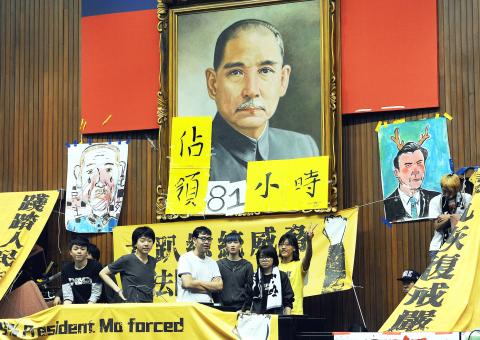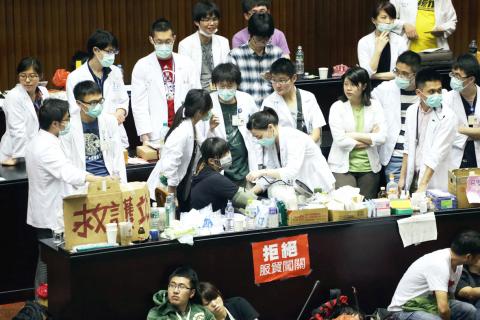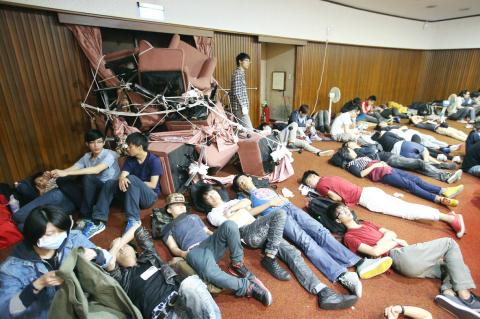The air quality in the Legislative Yuan’s main chamber has reached a hazardous level and could endanger the hundreds of students and activists who have occupied it since Tuesday night, Democratic Progressive Party (DPP) lawmakers said yesterday, urging that the air conditioners in the room be turned on.
“With about 300 students and dozens of reporters packed inside the chamber since Tuesday night, air quality — a basic human requirement — has become poor. We call on the Legislative Yuan to deal with the issue immediately,” DPP Legislator Tsai Chi-chang (蔡其昌) told a press conference in Taipei.
Legislative Yuan staff have refused to turn on the air conditioners because a legislative meeting is not being held in the chamber.

Photo: Fang Pin-chao, Taipei Times
DPP Legislator Chao Tien-lin (趙天麟) said an on-site inspection showed that the carbon dioxide level in the room has reached 1,600 parts per million (ppm), which is much higher than the maximum permitted by law — 1,000ppm — while the carbon dioxide level in the corridor outside the chamber is a normal 400ppm.
DPP Legislator Gao Jyh-peng (高志鵬) said the party’s caucus had raised the issue with the legislature’s employees, but was having trouble locating the appropriate officials, and believed the Legislative Yuan was using the lack of air conditioning as a tactic to punish the protesters.
Tsai Wei-min (蔡衛民), a member of the Legislative Yuan’s General Affairs Department, said the department would consider turning on the air-conditioners after an on-site inspection.

Photo: CNA
Air quality was not the only issue raised by protesters and opposition parties. They said they suspect the authorities have interfered with the Wi-Fi bandwidth around the Legislative Yuan compound, making it difficult for them to communicate through their smartphones and laptops.
They say communications have also been hindered by a lack of working electrical outlets in the chamber, some of which appear to have been tampered with to prevent protesters from recharging their mobile phones and other equipment.

Photo: CNA

The first global hotel Keys Selection by the Michelin Guide includes four hotels in Taiwan, Michelin announced yesterday. All four received the “Michelin One Key,” indicating guests are to experience a “very special stay” at any of the locations as the establishments are “a true gem with personality. Service always goes the extra mile, and the hotel provides much more than others in its price range.” Of the four hotels, three are located in Taipei and one in Taichung. In Taipei, the One Key accolades were awarded to the Capella Taipei, Kimpton Da An Taipei and Mandarin Oriental Taipei. Capella Taipei was described by

The Taichung District Court yesterday confirmed its final ruling that the marriage between teenage heir Lai (賴) and a man surnamed Hsia (夏) was legally invalid, preventing Hsia from inheriting Lai’s NT$500 million (US$16.37 million) estate. The court confirmed that Hsia chose not to appeal the civil judgement after the court handed down its ruling in June, making the decision final. In the June ruling, the court said that Lai, 18, and Hsia, 26, showed “no mutual admiration before the marriage” and that their interactions were “distant and unfamiliar.” The judge concluded that the couple lacked the “true intention of

EVA Airways today confirmed the death of a flight attendant on Saturday upon their return to Taiwan and said an internal investigation has been launched, as criticism mounted over a social media post accusing the airline of failing to offer sufficient employee protections. According to the post, the flight attendant complained of feeling sick on board a flight, but was unable to take sick leave or access medical care. The crew member allegedly did not receive assistance from the chief purser, who failed to heed their requests for medical attention or call an ambulance once the flight landed, the post said. As sick

INDUSTRY: Beijing’s latest export measures go beyond targeting the US and would likely affect any country that uses Chinese rare earths or related tech, an academic said Taiwanese industries could face significant disruption from China’s newly tightened export controls on rare earth elements, as much of Taiwan’s supply indirectly depends on Chinese materials processed in Japan, a local expert said yesterday. Kristy Hsu (徐遵慈), director of the Taiwan ASEAN Studies Center at the Chung-Hua Institution for Economic Research, said that China’s latest export measures go far beyond targeting the US and would likely affect any country that uses Chinese rare earths or related technologies. With Japan and Southeast Asian countries among those expected to be hit, Taiwan could feel the impact through its reliance on Japanese-made semi-finished products and